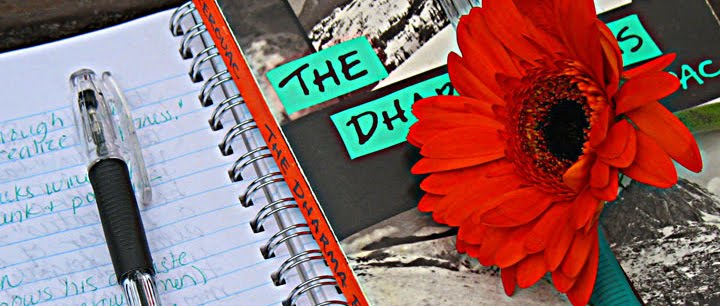I've taken one class in writing fiction. That's it. I had been writing stories all my life (since before I could write, just like my Jabberwock), and I had thoroughly decided that being a writer was my destiny, but once I got to college it was all, "Well, you'd better get a teaching degree, 'cause you know nobody needs an English major," and "Well, now you've taken all these Spanish classes so you may as well get a minor," and seriously, I have to take a physical education class??? There wasn't much room in my schedule for creative writing.
Luckily, I had a great teacher (Barton Sutter--a terrific storyteller, essayist, and poet as well as teacher--Google him, if you want to see), who took my final completed short story (the longest finished piece I had ever completed) and tore it to shreds. He gave it a B MINUS! Was he aware that I was a straight A student, about to graduate magna cum laude? Well, I was so pissed off I nearly cried. Then I gathered the pieces, started them on fire, and rewrote my story out of those bitter ashes. "I'll show him!" I vowed. The story came back from revision with a wonderful note about how much better it was, along with my A. Several years later, I found the story back, and it was still crap, but it must have been an improvement over the original.
Anyway, I remember having a discussion in that class about the old writing advice, "Write what you know." This blog would be much more interesting if I actually remembered the quote that Barton Sutter said about that, but essentially it was that yes, you should write about something you're familiar with, but you should also be discovering something in your writing. Maybe it was "Write what you don't know about what you know."
Well, I'm writing about breaking the law, a couple of sports cars, the juvenile court system, and an awful lot of teen boy angst. That's not exactly what I know. You know? But in another way, it is. I think that I do actually know an awful lot about angsty teenage boys, just from spending the better part of the last six or eight years around them as a teacher. I can research sporty cars (ask me anything about the Audi TT Roadster, by the way!) and what happens to juveniles when they are arrested for grand theft auto. What I'm discovering is my memory of what it feels like to be young and uncertain--to long for acceptance while resenting having to rely on anyone. The way emotions can be fierce and bewildering. The way injustice is all around me, and how that can make me want to punch things.
And lately? In this scene I'm writing now? I'm (re)discovering how awkward it can be to flirt with someone you really, really like, without ending up sounding cheesy and cliche.
And now...back to flirting! Any advice appreciated...

2 comments:
Hey, I emailed Barton Sutter about poetry once, and he emailed me back. <3 Unfortunately, not in time for Ms. Swenson, but that's another story.
I heard the 'write about what you know' stuff too. In the story I'M writing (which is not 10,000 words) I'm writing about a girl who kills people. The killing part, I don't know a heck of a lot about, because I've never done it. But I've watched a lot of Law & Order, I'll tell ya that much. The girl's personality is bits of me, bits of people I love, and then someone I've never ever met before (but would love to, minus the homicidal tendencies).
In both the protagonist and the killing, I got a fair bit of knowledge (maybe not from personal experience...) but I'm also learning a ton. It's a good motto.
About the flirting... I'm not so great, cuz all I had to do was write a few poems to my best friend of 4 years... ;)
What a great post.
One of my favorite novels is Penelope Fitzgerald's The Blue Flower, told from the point of view of an 18th century male German poet. Obviously not what she knew in terms of the superficials, but it's a love story, and she knew plenty about human emotions. Everything human is familiar in some way.
Post a Comment